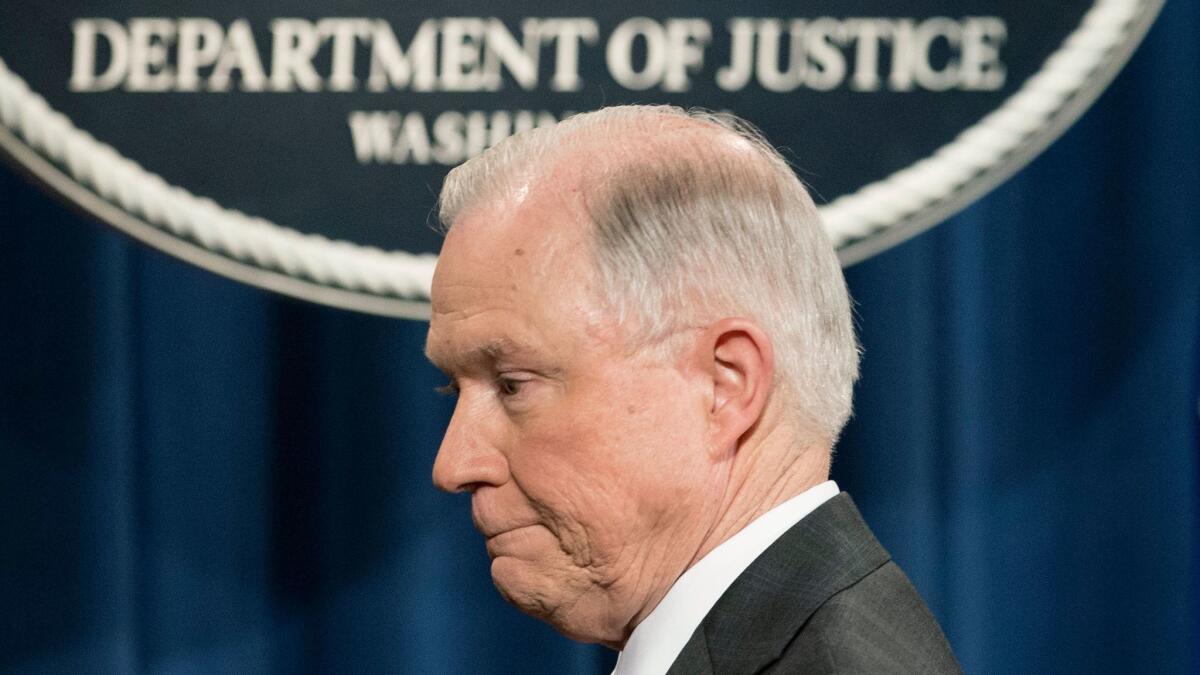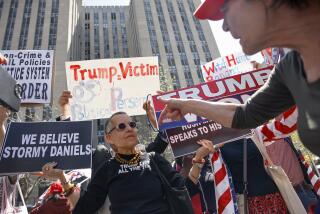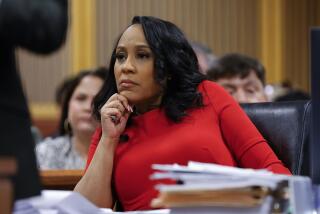Editorial: Jeff Sessions recuses himself from any investigation into Trump’s Russia ties. Better late than never

Giving new meaning to the phrase “better late than never,” Atty. Gen. Jeff Sessions finally has agreed to recuse himself from any Justice Department investigation touching on the 2016 presidential campaign in which he was an early and enthusiastic cheerleader for Donald Trump.
It long has been obvious that Sessions should play no role in any action related to what intelligence agencies say was an attempt by Russian intelligence to promote Trump’s campaign at the expense of Hillary Clinton. As this editorial page said last month, “Sessions needs to leave this issue to someone else.”
Yet it wasn’t until Thursday that Sessions announced he would withdraw from “existing or future investigations” of matters related to the campaign.
Sessions cited ongoing discussions with ethics experts in the department that just happened to conclude Thursday. But that hardly seems like the real motivating force.
His recusal also came after he became embroiled in controversy — a regular occurrence in the new administration — over his testimony to the Senate Judiciary Committee during his confirmation process. Sessions had said under oath that he’d had no contacts with Russian officials about the campaign, but in fact he’d met twice with Russian Ambassador Sergey Kislyak — once during the GOP convention, and later in his office after allegations about Russian attempts to sway the election had started to swirl.
Sessions insists it was an innocent misunderstanding and that he and Kislyak discussed Ukraine and other foreign-policy matters, not the campaign. Nevertheless, with Democrats raising questions about perjury and demanding Sessions’ resignation, several prominent Republicans called for him to step aside from election-related investigations.
It isn’t clear that the FBI, which reports to the Justice Department, is conducting a criminal investigation of Russian interference in the 2016 election campaign, as opposed to a counterintelligence investigation (although espionage also can be a criminal offense). It’s even less clear that any member of the Trump campaign is under criminal investigation for collusion in Russian hacking of Democratic email accounts.
Still, even the possibility that the Justice Department might be put in the position of investigating criminal activities that benefited the Trump campaign has always made it inconceivable for a Trump partisan such as Sessions to take a supervisory role. Now, any such investigation will be overseen by the deputy attorney general.
That position is held on an acting basis by Dana J. Boente, the U.S. attorney for the Eastern District of Virginia. Next week, the Senate Judiciary Committee is expected to hold a confirmation hearing for President Trump’s nominee for the deputy’s job: Rod J. Rosenstein, a respected career federal prosecutor who seems likely to win easy approval.
One of the questions Rosenstein likely will face is whether he could comfortably preside over an investigation of Russian meddling in the election while reporting to Sessions on other matters. A potentially better course would be to appoint a special counsel to handle the matter, as Rosenstein would have the power to do. In either case, Sessions would be out of the chain of command, as he should have been from his first day in office.
Follow the Opinion section on Twitter @latimesopinionand Facebook
More to Read
A cure for the common opinion
Get thought-provoking perspectives with our weekly newsletter.
You may occasionally receive promotional content from the Los Angeles Times.






